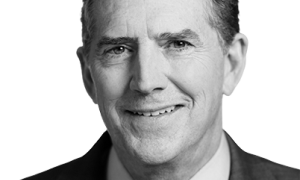In a couple of days I'm going to be in Philadelphia talking to folks at the National Constitution Center. I love visiting this city: The flood of history, the sheer number of great Americans who lived and worked in Philadelphia to bring our nation into being - and give it the best governing document in the world. It gets me every time.
But I don't have to look too far into the past to find great Philadelphians I admire. I wrote the first chapter of my latest book about one, actually.
His name is Bob Woodson. Born in South Philly in 1937, Bob grew up seeing both the face of poverty and the faces of those who helped each other through it. As a young man, he found work as a guard in a juvenile prison, where he got to know those left behind by "the system," who needed a personal connection and respect in order to reform their lives, not just a room to sleep in.
In the years that followed, Woodson became heavily involved in the burgeoning civil rights movement of the 1960s. Whether he was with the Westside Study Center in Pasadena, Calif., or back in Pennsylvania with the Human Relations Commission, he dedicated his life to organizing those left behind by "progress" and government institutions to better their own lives.
Woodson later went on to found the Center for Neighborhood Enterprise, which focuses on training and education for community leaders in ground-up neighborhood development, with an emphasis on local investment and ownership. Over the years, he's fended off Molotov cocktails during riots in Los Angeles, negotiated gang truces in Washington, and helped countless individuals get independent and get working.
Woodson's continuing efforts epitomize the best of America's "little platoons," those private-sector institutions dedicated to charity and cooperation at the local level. Whether they're families, churches, clubs, fraternal organizations, or mutual benefit societies, they come in many forms, and depend on volunteerism and generosity to accomplish their mission.
Unfortunately, many of these bulwarks of community have been pushed aside by big government in recent decades. Why scrape together fellow congregants to help the down-and-out when there are 80 different federal programs using our taxes to accomplish the same thing?
Unfortunately, all too often, those huge government initiatives accomplish little if anything at all.
We've already seen the problems that arise when the federal government steps into our hospitals to control our health care, or our schools to control how our children learn. Millions of Americans are painfully discovering that you can be a supporter of President Obama and still lose your insurance under Obamacare, and you can like your local teachers and still be disappointed in Common Core.
The same goes for social welfare. Everyone wants to help the poor, but half a century and $20 trillion since Lyndon Johnson launched his "Great Society" programs, the federal poverty rate remains almost unchanged. Unemployment is still high, and out-of-wedlock births - a good indicator of pervasive, multigenerational poverty - are over 40 percent. The mega-government approach to these problems doesn't seem to connect with people the way Woodson does.
I'm not arguing about taxes, political parties, or even the Constitution, although they all matter. I'm saying that on a practical level, an organization as large as the federal government is simply not competent to replace our country's little platoons: It lacks the perspective, the expertise, and the incentive to do a good job, especially when that job requires a local understanding of local problems.
Moreover, jamming America's wonderful diversity of viewpoints and lifestyles into one-size-fits-all policies doesn't unite the country. Rather, it has the opposite effect: When concerned citizens want to change these policies, instead of working it out between interested parties at the local level, every issue becomes a race to Washington, and to the regulator or legislator who will help quash the other side.
This system threatens to replace our affection for our neighbor with resentment, and our love of country with cynicism. It is an inevitable result of government taking over our private and communitarian efforts to better ourselves and each other.
This "business as usual" isn't going anywhere soon, but that's no reason to despair. Equally important to dismantling a broken system is going back to our little platoons, reenergizing them and rededicating ourselves to aiding those within our spheres of action. You know what your neighborhood needs better than some bureaucrat who's never been there.
We don't have to be in love with our politicians or the way they run government to love our country. We don't have to wait for them to clean up their act, either. There will always be people in our communities who need a helping hand, and patriotism will always flourish when we offer ours.
- Jim DeMint is the President of The Heritage Foundation.
Originally appeared on Philly.com



